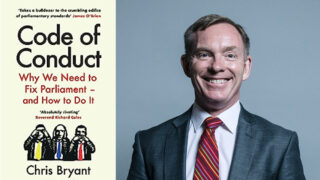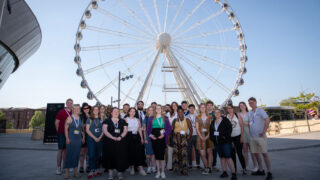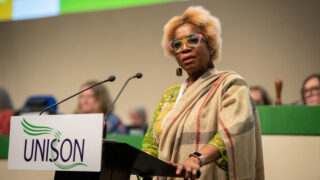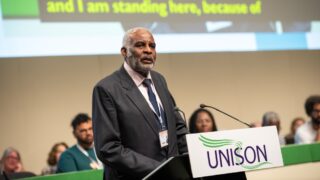National conference delegates this week voiced their determination to defend their rights as trade unionists and voters – against a wave of government suppression.
A debate on defending the right to strike focussed on the government’s Strikes (Minimum Service Levels) Bill, which the Lords sent back to the House of Commons last week, for the second time, with significant amendments that water down some of its anti-trade union aspects.
Moving the motion for the NEC, Liz Wheatley spoke of the use of work notices, which would allow employers to name specific staff on strike days – who would then be required to attend work under threat of disciplinary action or even being fired. “You know it will be a boss’s charter,” she said. “They will name the union reps as the people required to come in, as an attempt to break the strike.”
Delegates noted that UNISON must continue to lobby the Labour Party to ensure that, if it comes to power, it follows through on its commitments to repeal this and other anti-trade union laws.
Speakers on the the motion ‘taking effective action within the straitjacket of anti-union laws’ addressed the NJC strike ballot currently underway in local government, with local government and school workers deciding whether to take industrial action over the employer’s latest below-inflation pay offer.
Introducing the motion, Kath Owen of the NEC said: “We’re in the middle of a wave of industrial action. All of you in local government branches are working your socks off to get that ballot done.”
A delegate from Leeds said: “We want local government to join in the wave of strikes that have electrified the public in the last year. Tories out – strikers in.”
Delegates passed the motion, which calls on the national executive council to:
- devise and roll out training courses across all regions on how to organise industrial action ballots and win disputes, adjusting where appropriate for devolved public services, bargaining and employment law regulations;
- examine and explore the organising methods used in both local and national trade union ballots that have surpassed the 50% ballot thresholds in Great Britain;
- make recommendations on which methods of organising are key to holding successful industrial action ballots.
The motion ‘defend our right to vote – voter ID is voter suppression’ concerned the damaging consequences of the Elections Act, passed last year, which requires mandatory photo ID at all general and by-elections in the UK, and many other elections in England and Wales.
UNISON has already voiced its concern that the requirement will disenfranchise millions, particularly already disenfranchised and disadvantaged groups in society, who for various reasons, not least poverty, are unlikely to have acceptable ID such as passports and driving licences.
Proposing the motion, Becky Tye of Eastern region refuted the government assertion that the act was designed to suppress election fraud: in the 2018 general election, 58m votes were cast, with just 34 allegations of voter fraud.
Instead, she said, it was designed to “gerrymander, to manipulate the vote… to create a barrier to participation in our democracy for particularly Black people, LGBT+ people, young people, people with disabilities.”
Jacob Collier said that in the recent local council elections he encountered many people “eager and enthusiastic to vote, but unable to do so because they did not have the required photo ID.”
The government was creating “a regressive society where democratic rights have been curtailed,” he said.
“They know they can’t win [elections] with ideas, because they don’t have any. They know they can’t win on their record, because they don’t have one. So they have to sneak in by the back door.”
Passing the motion, delegates called on the NEC to:
- work alongside the TUC, WTUC, STUC and affiliated civil liberty organisations to continue to lobby against these draconian measures;
- work with Labour Link to influence the next Labour Party general election manifesto to commit to reversing this legislation;
- while the law remains, to continue to campaign for other forms of ID to be acceptable such s student ID and non-photo-ID.






